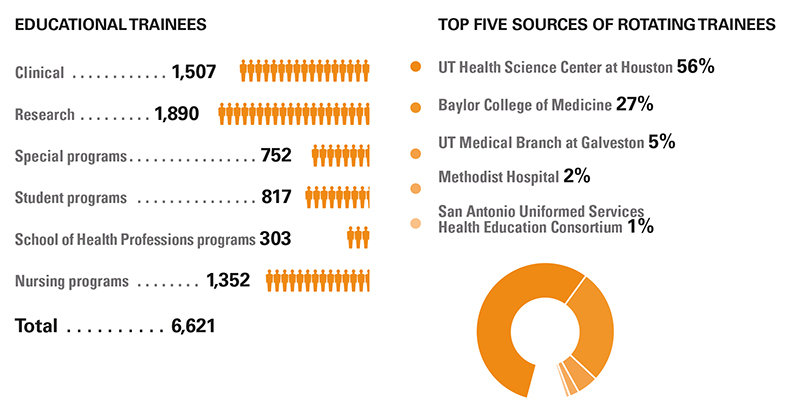School of Health Professions grants first master’s degrees
It’s only been a short time since graduation, and already the first students to earn master’s degrees from the School of Health Professions are having a global impact.
When they enrolled in the new MS in Diagnostic Genetics program, the students were drawn to its unique features — access to state-of-the-art labs and classrooms that can only be found within a comprehensive cancer center, and the one-on-one support of a world-class faculty.
“We’re one of only four graduate clinical diagnostic molecular science programs in the country recognized by the NAACLS (National Accrediting Agency for Clinical Laboratory Sciences),” points out Peter Hu, Ph.D., associate professor in the School of Health Professions and director of the new program.
The three members of that first graduating class are taking what they learned about clinical molecular diagnostics such as genetic disorder testing, cancer genetics testing and bioinformatics around the globe. One has returned home to the Bahamas, one has gone to a cytogenetics lab in Peoria, Illinois, and one has taken a research role at Baylor College of Medicine.
Information gained from molecular testing helps MD Anderson’s physicians move closer to the goal of precision medicine tailor-made for each patient by providing the data needed to analyze each patient’s genome. Graduates are able to provide good laboratory results efficiently, and are armed with the skills and knowledge to create new, more accurate testing procedures as needs arise.
A new degree
The students spend two years in a program that combines diagnostic genetics theory with hands-on practice in clinical rotations. They also participate in research aimed at making advances in diagnostic genetics while learning about the world of academic medicine. (One of the students’ final research projects is being submitted for publication in a leading journal.)
After graduation
After receiving their diplomas, all graduates are eligible to take board exams in either molecular biology or cytogenetics — or in some cases, both — to become certified in one or both fields by the American Society of Clinical Pathology. Certification is required to work in a clinical diagnostic setting. Graduates’ clinical and research training prepares them for a number of career options, and their rotations through many collaborative clinical partners — including UTMB Galveston, Baylor College of Medicine and Texas Children’s Hospital — give them experience outside the world of cancer.
Looking to the future
The program is growing fast as word spreads about the unique opportunities students are offered in the cytogenetics and molecular genetics specializations within the master’s degree. The second graduating class has seven members, and nine new students joined the program in the fall of 2015.
“As one of very few institutions that offer this program at both the undergraduate and graduate level, we’re uniquely positioned to help guide the next generation of scientists through the study and creation of genetic testing,” notes Hu. “This field is quickly evolving and the clinical diagnostic information gained from genomics is becoming entwined with quality cancer care.”






















